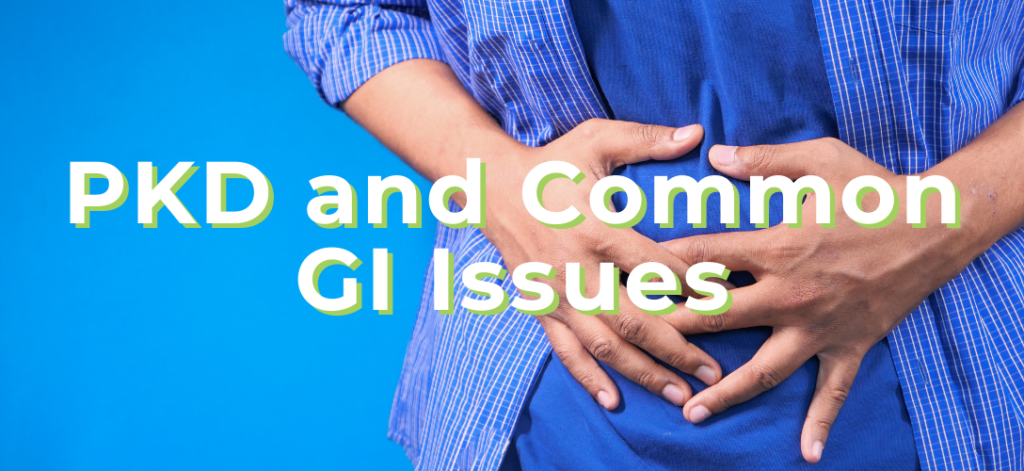
Published on January 11, 2021 | When you have PKD, your kidneys aren’t the only organs involved. Many people also have issues with their digestive systems. These are just a few links between PKD and common GI issues.
Liver Cysts
About 80% of people with PKD develop liver cysts, says Seth Goldberg, M.D., associate professor of medicine in the Division of Nephrology at Washington University School of Medicine, and it’s more common in women, thanks to estrogen.
“The good news,” says Dr. Goldberg, “is that these cysts do not cause the liver to shut down; they’re more structural, and they have no effect on liver function.” Many people might not even know they have liver cysts, because they can be symptomless and are often only discovered on routine CT scans. Dr. Goldberg says it’s extraordinarily rare to see a patient with liver cysts develop liver failure that requires a liver transplant. Sometimes, however, a patient will experience discomfort.
Common GI Issues with PKD You Should Talk to Your Doctor About
Really full after even small meals.
Known as “early satiety,” this sensation is often experienced because the liver and kidneys are taking up more space in your abdomen, leaving your stomach less room to expand after you eat something.
Pain, tenderness, or swelling.
Large cysts can be filled with up to 590 cubic centimeters of fluid (about the amount of a 20-ounce soda bottle), Dr. Goldberg says. Such cysts can be uncomfortable, cause your liver to become distended, and leave you with tender spots on your abdomen. If so, your doctor may recommend that a particularly large cyst be drained, a procedure in which a radiologist locates the cyst with ultrasound and uses a needle to remove the fluid. “In most cases, the cyst does come back, but it can take years to recur, so this is a fairly durable treatment,” Dr. Goldberg says.
Lower back pain.
An expanded liver could be pressing against your back and causing you lower back pain.
Want to see more articles like this? Read the full issue of our magazine, PKD Life, and subscribe to future issues here. You may also enjoy this recent article on PKD and UTIs.









My own mum had pkd the liver one too for over 12 years I been told I don’t have but I get billliary colic have gallstones and get ibs odd kidney infection too my own mums kidney at 60 was removed it was 8lb 2 oz
As a mom with a 6yr old adpkd warrior, pain doesn’t have to have a reason. My daughter still has full functioning kidneys with only a few small cyst. However she still gets kidney and back pain.
I am four years post transplant due to pkd and I have a few unexplained g.i. Issues. Thanks for this article, I’m going to ask my transplant team to look into this versus the pointless gastrointestinal appointments I’ve had.
I have late stage 3 PKD & have cysts in my liver. It is very uncomfortable. I’ve been able to stay very thin but the downside is that I can feel my cysts. I struggled with horrible nausea & a feeling like there was a sewer in my lower abdomen. I couldn’t clear my bowels well even though I was taking a large dose of Miralax twice a day for many years. This year I happened to max out my massive healthcare deductible so I figured Why not see a gastroenterologist & see if maybe there’s something they could do. I expected scans, tests & no cure. Instead my doctor prescribed Linzess. It took the 290mg dose but it has completely gotten rid of the sewer feeling, my bowels clear out thoroughly & my quality of life has improved so much it’s truly a blessing. Anyway, thought I’d share.
Thank you so much for sharing this information.
Anch’io con pkd, trapiantata di rene 10 anni fa a Udine. Il fegato policistico non da problemi, finora. Ho 67 anni, sto abbastanza bene, spero che continui così. Ho anemia, curata con epo varie, problemi digestivi rari, per fortuna🙏🙏🙏
Why do the physicians allow the liver to get so large that it affects the quality of life? Why not do a resection of the liver so they can breathe. It’s bad enough that they have to suffer with PKD PLD. We need a list of good nephrologist and those who deal with the liver. Mayo clinic should not be the only option
You might try looking through our Find-A-CLinic resource, some clinics report associated specialties like Liver specialists with expertise in PKD (or PLD specialists) https://pkdcure.org/find-a-clinic/